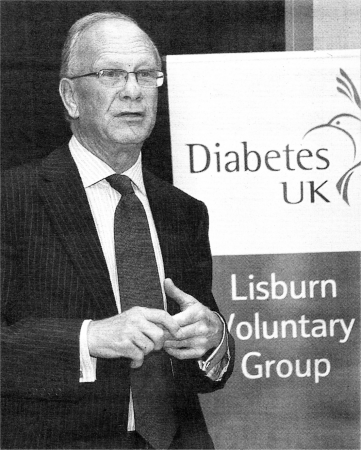By Stacey Heaney
 |
'I wrote to the
families of the donors, they were the most emotional
letters I have ever written in my life'
'It was hard
for me but it was worse for my family, it is the
carers who are the silent sufferers' |
|
Richard Lane speaking to the
Diabetes UK - Lisburn Voluntary Group in Laganview
Conference Centre, Lagan Valley Hospital on Monday
night. US3707351DW |
A MAN who received a transplant to help ease
the effects of his diabetes visited the city this week to give a
message of hope about how this life has been transformed.
Richard Lane was in Lisburn on Monday to
speak to a local diabetes group about his condition and the
incredible change in his life since the successful transplant
was carried out.
Richard from Bromley, Greater London.
received three Islet Cell Transplants between 2004 and 2005 at
King's College Hospital in London before he was found to be
insulin independent - a UK first for the transplant.
An Islet Cell Transplant, whilst not a cure
for diabetes, can vastly improve the quality of life. Before the
transplant Richard was on a 24-hour insulin pump having reached
a stage where he was having five insulin injections a day and up
to six major hypos (hypoglycaemia) a week when biood sugar is so
low the patient feels faint and can lapse into a coma without
warning.
"Its indescribable how it has transformed my
life and continues to do so," Richard said. "I'm back on insulin
at the moment as I have a problem with my immune system but
hopefully that is only temporary.
"The main purpose of the transplant is not to
be insulin independent, but to stop the terrible hypos, and
thankfully those have stopped."
The hypos almost had fatal consequences for
Richard when he was involved in a major car accident having
fallen into a coma at the wheel.
"It's the hypos that are the dread of any
insulin dependent diabetic," he said.
Richard had less than a minute's notice of the hypo and
crashed into a petrol station on the A21. "Apparently the car
came to a standstill before my foot hit the accelerator and the
car went into the middle of the busy road," he said. "I broke my
back in two places and spent the next two years in and out of
hospital. I was sent to the National Orthopaedic Hospital in
London where I had a massive operation on my spine to put in a
titanium cage."
Richard says his family, wife Paula and
children Rachel and Simon, were left to worry for him through
the years.
"I had a lot of comas abroad, in Switzerland
and France. as well as at home; it was hard for me but it was
worse for my family. it is the carers who are the silent
sufferers."
Having been persuaded by Professor Stephanie
Amiel to undergo the treatment, Richard received three
transplants.
"Because of the shortage of pancreases, the
transplant had to be done from people who had died with a
beating heart. The procedure has to be carried out quickly
before the cells are damaged. I needed three transplants and
afterwards I wrote to the families of the three donors, they
were the most emotional letters I have ever written in my life."
Richard would recommend other diabetics take
up the offer of the transplant if they can get it.
"They are at an advanced stage of approving
treatment," he said. "It is fairly probable, though not certain,
that next year they are going to fund it to make it available as
treatment. People I know have asked me if they should
have the treatment and I have always said,
'go for it'. Nothing would change my mind about having the
transplant.
"I still have to pinch myself every morning
to check I'm not dreaming."
Diabetes UK Lisburn Branch PR Officer Pat
Croskery commented, `We are delighted that Richard agreed to
come to talk to us. This offers all of us hope for the future
that this islet Cell Transplant could help diabetes go away for
the younger generation and those with Type 1 diabetes."
stacey.heaney@jpress.co.uk